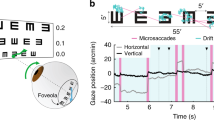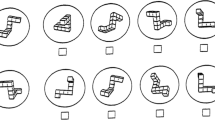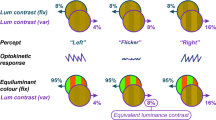Abstract
Lord and Wright, and afterwards Lord1, have published records of involuntary movements made by the eye during fixation, showing excursions as great as twenty minutes of arc, whereas Hartridge and Thomson2 only found movements of about one-tenth of this amount. The former workers had their subject in the prone position and looking upwards, in the interests of head fixation, while the latter had their subject erect and used a technique designed to discount the effects of head movements.
This is a preview of subscription content, access via your institution
Access options
Subscribe to this journal
Receive 51 print issues and online access
$199.00 per year
only $3.90 per issue
Buy this article
- Purchase on Springer Link
- Instant access to full article PDF
Prices may be subject to local taxes which are calculated during checkout
Similar content being viewed by others
References
Lord, M. P., and Wright, W. D., Nature, 162, 25 (1948); 163, 803 (1949). Lord, M. P., Proc. Phys. Soc., 61, 489 (1948). Wright, W. D., The Refractionist, 31, 53.
Hartridge, H., Phil. Trans., B, 232, 519 (1947). Hartridge, H., and Thomson, L. C., Brit. J. Ophth., 32, 581 (1948).
Wolff, E., “The Anatomy of the Eye and Orbit”, 3rd edit., p. 219.
Author information
Authors and Affiliations
Rights and permissions
About this article
Cite this article
CHARNWOOD Effect of Posture on Involuntary Eye Movements. Nature 166, 348–349 (1950). https://doi.org/10.1038/166348b0
Issue Date:
DOI: https://doi.org/10.1038/166348b0
Comments
By submitting a comment you agree to abide by our Terms and Community Guidelines. If you find something abusive or that does not comply with our terms or guidelines please flag it as inappropriate.



